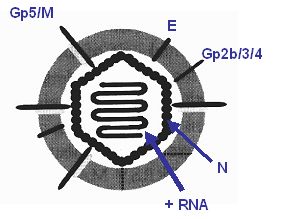|
|
Mechanisms of Viral Entry and Replication
|
|
Project: Entry Mechanism of Equine arteritis virus (EAV)
Mathias Nitschke
Equine arteritis virus (EAV) is an enveloped, positive-stranded RNA
virus belonging to the family Arteriviridae, which can cause severe
problems in horse breeding. The outcome of arterivirus infection can
range from an asymptomatic, persistent carrier state to abortion or
lethal haemorrhagic fever. The primary host cells are the horse
macrophages.
EAV contains seven structural proteins which are essential for virus
infectivity and maturation (Fig. 1). The nucleocapsid protein
N forms an isometric core particle which is surrounded by the lipid
envelope. N and the complex of the non-glycosylated membrane protein
M and the major glycoprotein Gp5 are required for virus assembly.
The putative envelope heterotrimer of the glycosylated proteins
Gp2b, Gp3, Gp4 (ratio: 1:1:1) is a prime candidate for
receptor-binding and for fusion of EAV envelope with the cellular
target membrane.However, so far not much is known about EAV entry
and fusion mechanism. |
 |
|
Fig.1: Structure of EAV |
Results:
Infection by EAV requires the release of the viral genome by fusion with the
respective target membrane of the host cell. In order to find out, whether the
virus utilizes the endosomal or the non-endosomal pathway, we have investigated
infection of Baby Hamster Kindey cells (BHK) by EAV.
Infection of cells assessed by the plaque reduction assay was strongly inhibited
by substances which interfere with clathrin-dependent endocytosis and by
lysosomotropic compounds. Furthermore, infection of BHK cells was suppressed
when clathrin-dependent endocytosis was inhibited by expression of antisense RNA
of the clathrin-heavy chain before infection (Fig.2). These results
strongly suggest that EAV is taken up via clathrin-dependent endocytosis and is
delivered to acidic endosomal compartments.
 |
Fig.2: Infection of BHKasc cells by EAV. (A) Control (B) Cells
with depressed clathrin-dependent endocytosis.
After 24h p.i. cells were fixed and examined, stained with TRIC
(red) antibodies against EAV nucleocapsid protein. |
References:
Nitschke, M., Korte, T., Tielesch, C., Ter-Avetisyan, G., Tünnemann, G.,
Cardoso, M.C., Veit, M., Herrmann, A. (2008)
Equine arteritis virus is delivered to an acidic compartment of host cells via
clathrin-dependent endocytosis.
Virology 377, 248-254.

